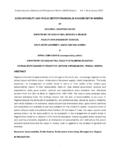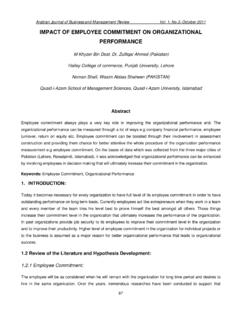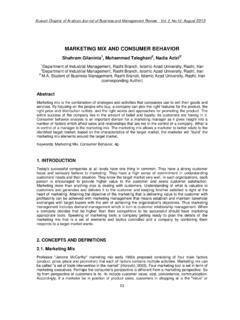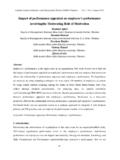Transcription of ENTREPRENEURSHIP POLICY IN SOUTH AFRICA
1 Arabian Journal of Business and Management Review (OMAN Chapter) Vol. 3, ; April. 2014. ENTREPRENEURSHIP POLICY IN SOUTH AFRICA . Shahida Cassim (PhD). Professor, University of Kwa Zulu Natal, Business School, Westville Campus, Durban, SOUTH AFRICA Paresh Soni Researcher, Management College of Southern AFRICA (MANCOSA), Durban, SOUTH AFRICA Anis Mahomed Karodia (PhD). Professor, Faculty Member and Senior Researcher, Regent Business School, Durban, SOUTH AFRICA ABSTRACT. This paper tracks the development of ENTREPRENEURSHIP POLICY in SOUTH AFRICA since the birth of democracy. Using the variety of measures suggested by the OECD Framework for measuring ENTREPRENEURSHIP , the ENTREPRENEURSHIP Indicators Project and GEM, this paper explores the development of a model for the evaluation of ENTREPRENEURSHIP policies of SOUTH AFRICA .
2 The point is made that while the stimulation of ENTREPRENEURSHIP and small business is important to SOUTH AFRICA , the global competitiveness race and the moves occurring in other parts of the world require us to hasten towards the development and adoption of policies that encourage innovation and ENTREPRENEURSHIP . There appears a concentration of effort at interventions aimed at ENTREPRENEURSHIP for the purposes of poverty alleviation and job creation. While this is laudable, it is suggested that more emphasis should be focused on stimulating growth of existing businesses and encouraging innovation for real ENTREPRENEURSHIP in the country. Despite the E POLICY interventions, we are relatively slow in measuring the impact of these policies on our economic development and welfare.
3 This paper attempts to rectify this. Key Words: ENTREPRENEURSHIP , Development. Indicators, Welfare, Framework, Small Businesses, Policies, Poverty Alleviation Introduction The current global financial crisis has highlighted the shortcomings of industrial POLICY to promote economic growth and development in a sustainable manner. The favoured approach of many governments, of focusing exclusively on industrial POLICY to promote economic growth, cannot be pursued any longer, particularly if the objective is to reduce unemployment and poverty. As policymakers find new or alternate models of growth and sustainable development, the Organisation for Economic Co-operation and Development (OECD, 2011a) and UNCTAD have suggested that policies to promote growth and economic prosperity should be inclined toward enabling an environment that fosters ENTREPRENEURSHIP and Small and Medium Enterprise (SMEs).
4 Their suggestions are affirmed through evidence from the emerging economies of China and India, in which, approximately 97 per cent of jobs are created by entrepreneurs in SMEs (OECD, 2011a). More importantly, whilst other countries have experienced negative growth rates (increasing but at a decreasing rate) during the recession, China and India have experienced positive growth rates of up to 10% in some quarters (Chidambaram, 2011). Given its benefits, ENTREPRENEURSHIP has risen on the agendas of POLICY makers across the globe as a formidable channel for economic and social progress. 29. Arabian Journal of Business and Management Review (OMAN Chapter) Vol. 3, ; April. 2014. However, the OECD has principally noted two serious constraints to effective ENTREPRENEURSHIP POLICY .
5 First, the regulatory environment, especially in terms of tax and access to finance, often negate strategies that aim to encourage people to become entrepreneurs. Secondly, measuring the effectiveness of these policies and modifying them accordingly is often an unworkable task given the lack of useful data (OECD, 2011a). If governments are to increase their commitment and investment in strategies to promote ENTREPRENEURSHIP , accurate measures are needed to assess their effectiveness, in order that they may be modified accordingly. Ahmad and Hoffman, (2008:3) acknowledge that: Many countries now recognise ENTREPRENEURSHIP POLICY as a separate discipline and, as a consequence, have taken steps to improve the measurement of ENTREPRENEURSHIP at the national level.
6 At an international level, programs by the World Bank, Eurostat and private organisations such as the Global ENTREPRENEURSHIP Monitor have also started to develop internationally comparable data . The Importance of ENTREPRENEURSHIP Empirical evidence suggests that ENTREPRENEURSHIP plays specific, but important roles in economic development. ACS (2006) notes that entrepreneurs, in developed and developing countries, help keep the levels of unemployment and poverty low; simply because they create new businesses, and new businesses in-turn create jobs. High levels of ENTREPRENEURSHIP will thus translate into higher levels of economic development and growth in the macro economy. ENTREPRENEURSHIP is often cited as a crucial tool that facilitates the transformation of a country's economy from a developing one to a developed one.
7 It achieves this by facilitating the structural transformation of countries from low-income, factor driven societies, into high-income technology- based societies (Naud , 2008). Thus, through the application of existing technologies in innovative ways or launching new technology, entrepreneurs not only increase competition in the market, but also create positive market externalities. More specifically, Van Praag and Versloot (2007) identify economic benefits of ENTREPRENEURSHIP in four main categories, namely: (i) Employment generation; (ii) innovation; (iii) productivity and growth; and (iv) increasing individuals' utility levels. Expanding on the important role of entrepreneurs as innovators, Berglund (2005) states that entrepreneurs disrupt prevailing equilibria (a process of creative destruction) in economic markets through innovation, thereby changing various economic benchmarks and enabling growth within the economy.
8 SOUTH AFRICA 's current economic and socio-economic conditions demand serious economic reform. Although SOUTH AFRICA is one of the strongest economies in AFRICA , it is distressing to note that unemployment and poverty are still major issues for the majority of citizens. According to Statistics SA (2011), approximately 24% of the working age population is unemployed. Moreover, infrastructure always has and continues to be, a key constraint to economic growth and sustainability in SOUTH AFRICA (Green, 2011). Furthermore, Foreign Direct Investment (FDI) into SOUTH AFRICA has, over the last two years, slumped by almost 25%, (Creamer, 2010). This aggregates the problem of jobless growth, which in essence, is not beneficial to SA's current situation.
9 Entrepreneurs are however, flexible in dealing with poor infrastructure. Smaller firms are more labour intensive than larger firms, and therefore incur lower capital costs and require relatively lower levels of infrastructure in the job creation process. Their ability to utilise labour in favour of capital makes them more likely to succeed in rural, as well as developing urban areas, where they are able to contribute to the spread of economic activity and a more equitable distribution of income within the economy (Abor and Quartey 2010:28). Naud (2010) affirms the position that entrepreneurs are the main vehicle for economic development, adding that as the number of entrepreneurs in an economy grows, so does the economy. 30. Arabian Journal of Business and Management Review (OMAN Chapter) Vol.
10 3, ; April. 2014. Entrepreneurs in developing countries have more opportunities to exploit thereby increasing the potential for ENTREPRENEURSHIP to contribute to decreasing unemployment and increase economic growth. Abor and Quartey (2010) note that SMEs in SOUTH AFRICA produce up to 57 per cent of the country's Gross Domestic Product (GDP), and provide about 60 per cent of all employment. In this respect, entrepreneurs can be described as Efficient and prolific job creators, the seeds of big businesses and the fuel of national economic engines , especially in a developing country like SOUTH AFRICA (Abor and Quartey, 2010). Despite this, SOUTH AFRICA performs poorly on the Global ENTREPRENEURSHIP Monitor (GEM). rankings. In 2009, SOUTH AFRICA ranked 35th out of the 54 GEM countries with a TEA (Total Early stage Entrepreneurial Activity) rate of This is significantly lower than the average for efficiency driven economies : and middle to low income countries : According to Herrington et al (2009) a country at SOUTH AFRICA 's stage of economic development should have be expected to have a TEA rate in the order of 13%.














